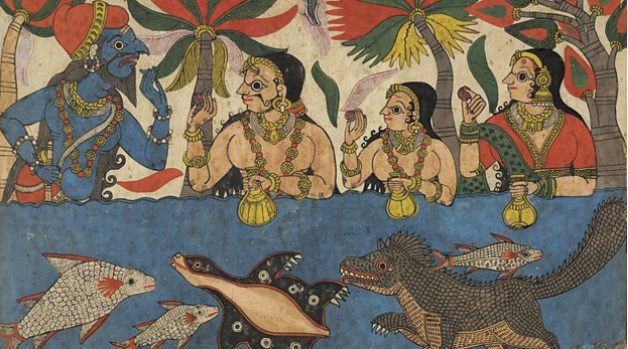Living Without The Gods: Is Britain done with religion?
Is Britain trying to become 'the first society in the world without religious belief at its core'?
According to Neil MacGregor, formerly director of the British Museum and presenter of a new BBC Radio 4 series, Living With The Gods, it is.
The 30-part series will trace '40,000 years of believing and belonging' and will feature objects from the museum – showcased in a parallel exhibition – that show how religion has shaped society.

Objects that feature in the series include the Lion-man, a prehistoric ivory sculpture which is determined to be between 35,000 and 40,000 years old; a 1682 noticeboard from Japan, which listed rewards for information on Christian priests, believers and sympathisers; the Lampedusa Cross, made from pieces of a boat that was wrecked off the coast of Lampedusa, Italy in 2013, and the largest silver objects in the world, two silver vessels from Jaipur which were created between 1894 and 1896 for Maharaja Sawai Madho Singh II.
According to the Daily Telegraph, MacGregor believes religion provides a 'narrative' that explains our place in the world. Its decline in Britain means that, 'In a sense, we are a very unusual society. We are trying to do something that no society has really done. We are trying to live without an agreed narrative of our communal place in the cosmos and in time.'
MacGregor believes that 'homo sapiens is also homo religiosus'. But, he says: 'Our society is, not just historically but in comparison to the rest of the world today, a very, very unusual one in being like that. We are exceptional. It's important to know that we are different.'
From being at the centre of national life expressed in great moments like the Coronation, the last surviving public expression of Christianity, he says, is Christmas – and even that isn't very religious any more.
It's possible to take issue with MacGregor's reported comment that no society has tried to live without religion before. Tell that to the Christians in Russia, China and North Korea, where the regimes did their very best to do just that; and MacGregor's analysis of contemporary Britain's religious landscape isn't really compelling.
But the Living With The Gods enterprise itself is fascinating. As Nick Spencer, research director at theological think tank Theos, tells Christian Today: 'There's not been a society known to history – or pre-history – that hasn't had some form of religious belief and practice at its heart.'
He welcomes the series and the exhibition. Religion does bind us together, he says, giving us shared values that can turn individuals and family groups into cohering societies. But also: 'Religion locates us on the canvas of the universe, offering us a sense of identity, purpose and destiny – our own and those of loved ones – that we, uniquely conscious of our mortality and brevity among animals, desperately need. Those societies that have tried, at great cost to eradicate religion, have ended up copying it, for just these reasons. Man does not live by bread, TV or social media alone.'
It's a 'slight exaggeration' to say Britain is trying to do without religion altogether, he believes – religious belief, practice and identity remains widespread even in so-called secular Britain – but more importantly, 'Contemporary society, as a whole, seems to think a highly individualised and largely material shape for human existence is enough to secure our wellbeing. It isn't.'
And, he concludes: 'We would do well to listen to the message of Living With The Gods – in particular its emphasis on a shared narrative that sees humans as more than just brainy primates – if we seek to flourish as human beings.'
The British Museum is a treasure trove of objects found, bought or less worthily acquired. An exhibition like this can enormously expand our understanding of religion. But it should also remind us that religion – even in today's Britain – doesn't belong in a museum, but out in our streets, homes and market places.
'Living With The Gods' will be broadcast from October 23 over six weeks at 9.45am with a repeat at 7.45pm.











